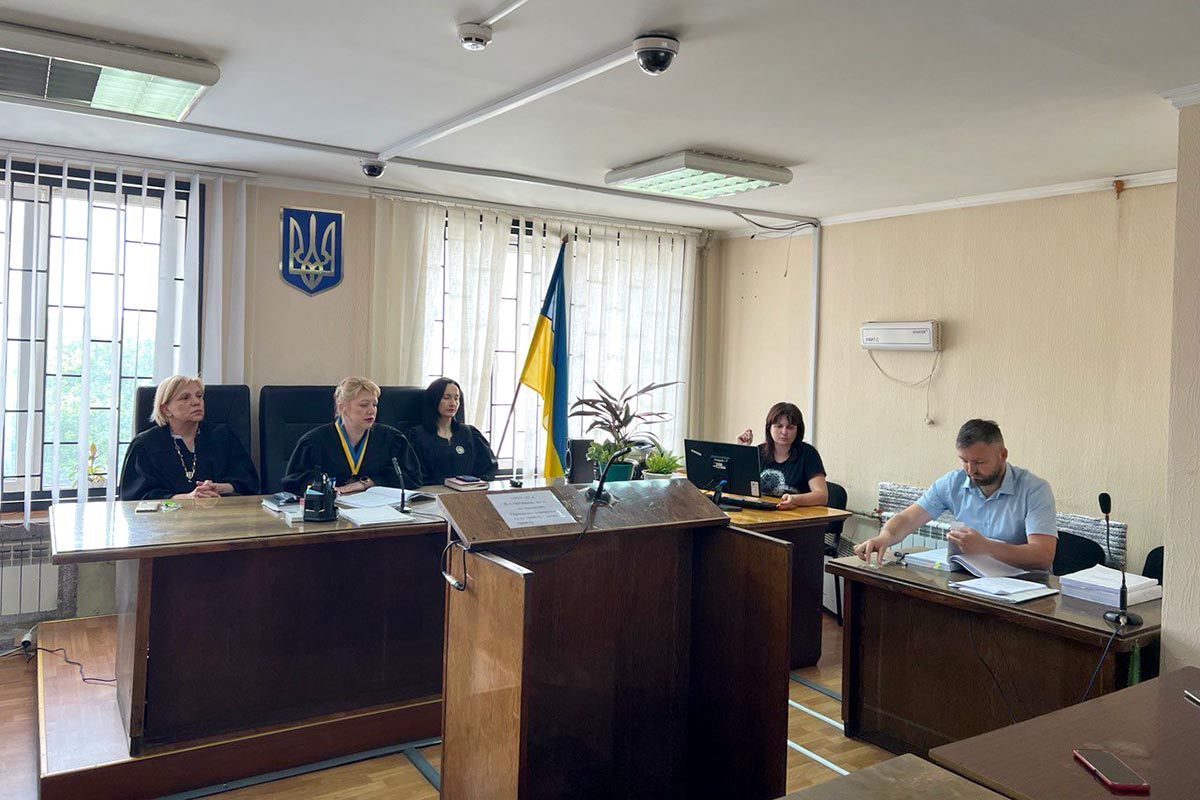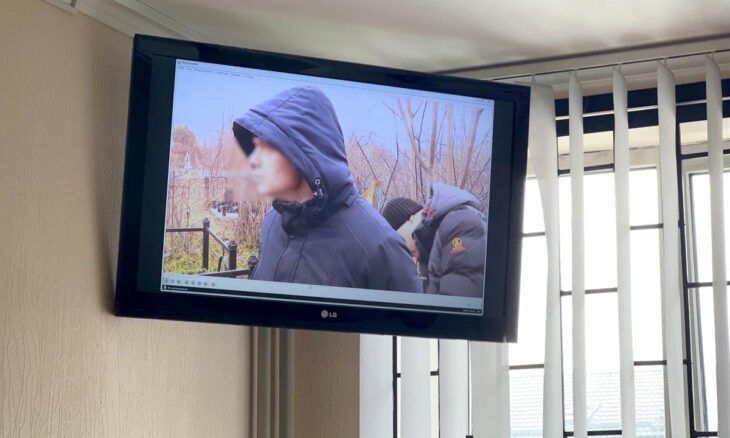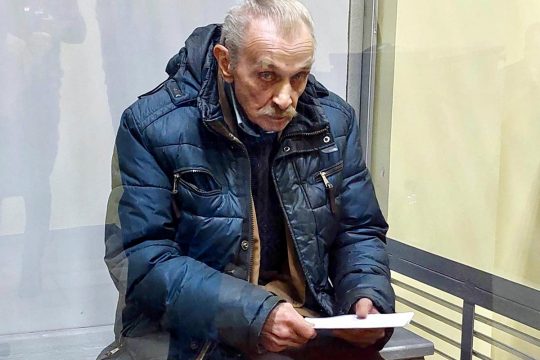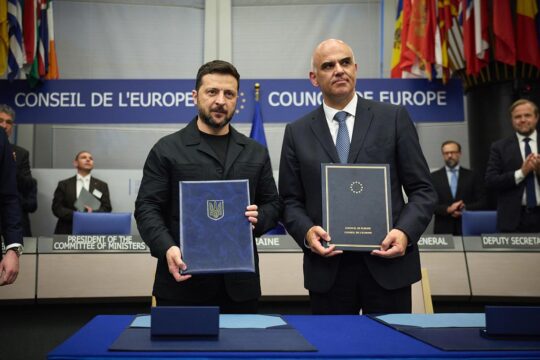“I was carrying out the order of the Supreme Commander-in-Chief, who asked the Russian Federation for assistance and help in 2014. Then a revolution was staged, but in my opinion, it was a state coup. They destroyed the country,” the accused told the court. The man says he has remained loyal to ex-president of Ukraine Viktor Yanukovych, who was himself tried for treason in absentia in 2018, four years after the Maiden revolution that led to his removal and flight to Russia.
A number of media were present at the trial on May 29 when the Leninsky District Court of Kropyvnytskyi (central Ukraine) heard the case of Mykola Fomenko, a "strike “corrector" caught in the act and charged with high treason under martial law. Such actions are punishable by a jail sentence of between 15 years and life, with confiscation of property.
The accused was escorted to the court hearing by his defence counsel Angelina Dudnyk, appointed by the Free Legal Aid Centre. 41-year-old Fomenko is a native of Odesa. He has been living in Kropyvnytskyi for a long time. The man studied at two local colleges. First, he studied to become a television and radio mechanic, and then a cook. Between 2001 and 2005 he studied agricultural machinery at the Kirovohrad National Technical University. In 2008, he completed a master's degree in electrical and electromechanical engineering at the same university. In 2013, he was offered a position of electrical engineer at a local branch of a state-owned railway company, affiliated with the Ministry of Infrastructure of Ukraine.
He has worked there, without any issues, till recently. The investigation revealed that in November 2022, an agent of the FSB, the Russian intelligence service, contacted Fomenko on Telegram and offered him to cooperate. He asked him to provide information about the location of the Ukrainian military counter-intelligence service (SBU) buildings, police stations, military recruitment offices, strategically important bridges, military units, and a special forces regiment. The information was to be sent every Tuesday and Friday between 8 and 9 p.m, and Fomenko fulfilled the order.
Then, the agent gave him the task to film the territory of a power station in Kropyvnytskyi, buy and install a car tracker there. The tracker was supposed to be used to prepare a missile attack that was planned on January 22, 2023. The day before, SBU officers arrested Fomenko near the station and seized the tracker he had planted.

Intercepted correspondence and secret filming
The prosecutor and defence agreed to consider the case according to a simplified procedure - without examining the entire body of evidence – and, as became known in court, Fomenko was included in a prisoner exchange list.
During the trial, some of the correspondence between the defendant and the FSB agent leading up to the planting of the tracker was reviewed. The prosecution was represented by the prosecutor of the Kirovohrad Regional Prosecutor's Office, Volodymyr Leshchenko, who read aloud correspondence (in Russian) that was intercepted in January 2023.
- Good evening. The electricity is off every other day. But less often in the downtown. No aircraft flights were heard. Water is supplied. There are no queues at military recruitment offices, writes Fomenko.
- Good evening, Mykola. Thank you for the information. Everything is going according to plan. We'll be in touch tomorrow. Have you powered up the tracker? Please also write back about the situation in the city, answers the FSB agent.
- Yes, I have. Can I bury it? Is it waterproof?
- You just need to put it on the ground.
- Will it be visible when it blinks?
- Cover the lights with duct tape.
- Let's hope there are no cameras there and that I won't be spotted. I'll also buy some pepper to throw off the dogs' sense of smell.
Eloquent video evidence was also shown in court.
Investigators recorded Fomenko picking up a package at a “Nova Poshta” delivery point. Then they filmed him on his route from home to the power station. Then the camera recorded him approaching the fence near the critical infrastructure facility, putting down the device, and throwing something out on the way back. As the prosecutor explained, it was the pepper. When the man walked away, he began typing something on his phone. At that moment, he was knocked down, surrounded and apprehended by law enforcement officers.
“Only biscuits” in his bag
At his trial, Fomenko initially refused to cooperate, did not unlock his phone, saying that the investigators "already knew everything”, because they had been “spying” on him for a long time". He said that everything was set up by the SBU, and that he had “only biscuits” in his bag. He complained that he had been beaten during his arrest and that it was unnecessary, he was not resisting. The man did have abrasions and dirt on his clothes caused by the fall.
The investigators examined the content of the package Fomenko had with him when he was arrested. Among other things, it contained pouches of black and red pepper and a piece of paper. At first, the detainee refused to show where he had left the tracker, but after a while he nodded to the place where it had been planted. Investigators removed a SIM card from it.
According to the prosecutor, the examination established that the piece of paper found in the defendant's bag was identical to the one in which the tracker was wrapped. According to the prosecution expert, the device operates on the basis of a GPS network with satellites. It can be used to remotely locate and control web-tracked objects via software.
When asked by presiding judge Svitlana Lyon, Fomenko confirmed that he understood the content of the charges and confessed to everything. He said he did not know for sure who the FSB agent was, but he was convinced and hoped that it was indeed an agent.
Upon the judge's question about his motivations, the accused said he was following the order of Viktor Yanukovych, the fugitive ex-president. "It's all normal. He asked the Russian Federation to assist and provide help in 2014. And no one cancelled these orders,” explained Fomenko, who refused to communicate with journalists after the hearing.
A 15 year sentence… with prisoner exchange
Prosecutor Leshchenko asked the court to sentence the defendant to 15 years in prison with confiscation of property, including his phones and apartment. Defence lawyer Dudnyk asked for a softer sentence, as her client had pleaded guilty, and filed a motion for the return of his phones and his computer system unit. The three judges considered Fomenko guilty of high treason and sentenced him to 15 years in prison with confiscation of property.
But after the court hearing, prosecutor Leshchenko confirmed that the accused had filed a request for prisoner exchange and that the Russian side had included him in the list. According to the prosecutor, there are currently two more high treason cases pending in the region, where an exchange is expected to bring back Ukrainian prisoners.
This report is part of our coverage of war crimes justice produced in partnership with Ukrainian journalists. A first version of this article was published on the "Gre4ka" website.







